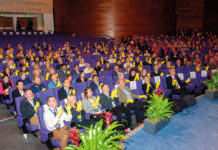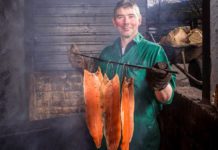Trade calls on government to meet broadband targets
By Jack Walsh
OPERATORS, hospitality trade groups and councillors have urged the Scottish Government to do more to speed up the process of rolling out superfast broadband to rural areas of Scotland.

The internet continues to play an increasingly influential role in the tourism industry, with figures from VisitScotland showing that 68% of visitors start their holiday planning online, and 57% of all travel reservations are made online.
 The Scottish Tourism Alliance reckons customers now expect to be able to book and pay online, as well as use their phones to check out reviews of restaurants, bars and hotels before they decide where to visit.
The Scottish Tourism Alliance reckons customers now expect to be able to book and pay online, as well as use their phones to check out reviews of restaurants, bars and hotels before they decide where to visit.
Marc Crothall, chief executive of the Scottish Tourism Alliance, said digital connectivity “is vital to the sustainability of our future economy”.
This view was echoed by Willie Macleod, executive director for Scotland at the British Hospitality Association (BHA).
He said: “It’s a key plank of the tourism strategy; it’s a key plank of the Government’s economic development strategy.”
However, despite the development of the £410m Digital Scotland Superfast Broadband project – a joint initiative between the Scottish Government, Highlands and Islands Enterprise and BT which aims to provide 100% fibre broadband coverage across Scotland by 2021 – progress in some areas has been slow.
Macleod of the BHA pointed out that, in hospitality terms, five years is a long time.
He also cited the uncertainty of Scotland’s position post-Brexit as a pressing concern, and said the Scottish Government should ensure the goal of 100% coverage materialises “as quickly as possible”.
Crothall of the STA took a similar stance, stating that “if ensuring maximum coverage is a priority, it may well be the case that the government needs to look at additional providers to build the network infrastructure required”.
Several rural operators told SLTN that they continue to feel let down and frustrated by poor broadband coverage.
Shirley Spear, who owns The Three Chimneys on the Isle of Skye with husband Eddie and chairs the Scottish Government’s Food Commission, said “the speed with which the [Scottish] Government operates is just deplorable”.
“I know they’re doing their utmost to spread broadband to 100% of the country but we need it now, in fact we needed it four years ago, not now, not in 2020,” said Spear.
“And the whole process is just driving many small businesses to distraction.”
Internet connectivity is increasingly important to operators, said Spear, as consumer expectations change.
“Tourism is changing, people coming out into the wild open countryside are expecting everything to be pretty much as it is in the city, only a little bit more remote,” she said.
James Creane-Smith of The Tannochbrae Restaurant in Dufftown agreed.
He said operators have “got to remain connected”; he told SLTN more customers now expect wi-fi, adding that 35% of bookings “will automatically ask if you’ve got wi-fi, because a lot of people are looking to plan the next leg of their journey”.
But coverage in Dufftown remains patchy, according to Creane-Smith, who said “you can go on one side of the [clock] tower and you can have the infinity; ten metres away and you’ve only got standard [broadband]”.
Coverage inconsistencies are also present in Dunoon.
Digital enablement is a key plank of the national tourism strategy.
Sandie Shahi, general manager of The Argyll Hotel, told SLTN that while the hotel benefits from reliable, fast speeds, its sister hotel, The Esplanade, situated less than a mile down the road, suffers from “intermittent [coverage], there can be delays and buffering”. She said that with up to 80% of reservations coming via online booking “we’re highly dependent on the internet for our business day-to-day running”.
The importance of reliable coverage was also stressed by local councillors.
Orkney Islands Council convener Steven Heddle told SLTN “broadband has to be regarded in the same way as other essential services like water and electricity”. “There is, otherwise, the very real risk that many areas of Orkney will miss out on successive generations of broadband widening the digital divide and leaving some parts of our community with extremely poor connections or no service at all,” said Heddle.
Taking a similar stance councillor Donald Crichton of Comhairle nan Eilean Siar (the former Western Isles Council) acknowledged that while “much good work has been done and many homes and businesses now have an excellent service”, there are still “clearly challenges” within the rollout of this project.
Councillor Margaret Davidson of Highland Council reckons the goal of 100% superfast internet coverage will only be achieved “if [the Scottish Government] put enough money into their spending review”.
Work to extend Scotland’s network continues, and a spokesman for BT commented that delivering fibre broadband across Scotland “is the biggest challenge of its kind in the UK”.
The spokesperson added that BT could “understand the frustration of those who can’t access the higher speeds yet, but the scale of the challenge needs to be recognised”.
A Scottish Government spokesperson said it is “absolutely committed” to delivering 100% superfast coverage.























